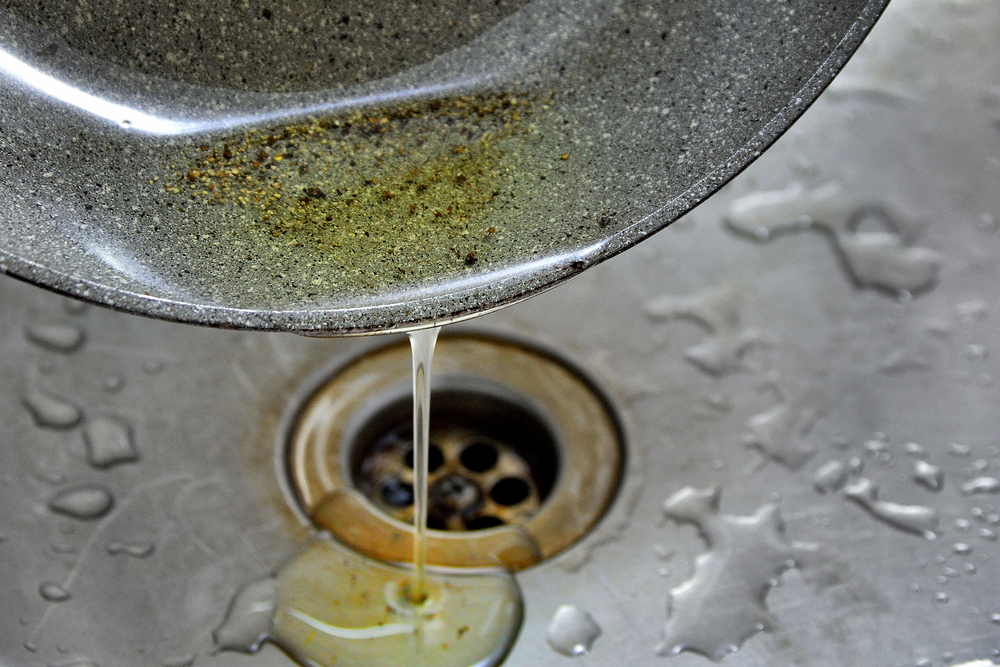
You’ve just sauteed up a beautiful meal in Plano, TX, and all you can think about is sinking your teeth in. But there’s all this cooking oil left over, and you’re not sure what to do with it. Well, the sink is right there; it wouldn’t hurt to pour the leftover cooking oil down the drain, would it?
If you’re thinking about pouring oil down the drain: Stop right there! While it seems like the most convenient option at the time, it’s actually quite the opposite. Pouring cooking oil down your drain can cause a host of problems that will cost you time and money to fix.
In the end, you’ll wind up frantically searching for “plumbers near me” or “plumbing repair near me,” and you’ll have a big service bill to handle as well. Save yourself time, money, and hassle by disposing of your hot grease the right way the first time.
What Happens When You Pour Hot Oil Down the Drain?
When you pour hot oil down your drain, it will flow out easily as a liquid. However, hot oil and grease don’t stay in liquid form. Instead, they solidify as they cool, and this is where the problem lies.
As the grease solidifies in your pipes, it will cause a blockage. If you only do it once, or if you only pour a small amount of oil down your drain, you may be blissfully unaware of how much damage it can cause.
However, if you pour enough oil or have older pipes, one time may be all it takes to wind up in an emergency plumbing situation that leaves you in desperate need of professional drain cleaning services.
You see, hot oil can wreak havoc on your plumbing system. As it makes its way through your pipes, this oil can solidify and cause a blockage. Even if you only pour down a little hot oil, it can still fuse with residue, hair, and food particles to create a massive blockage.
Eventually, this blockage will keep clean water from flowing, sending dirty water back up through your pipes. This could render your sink unusable until you call a professional for drain cleaning services.
Issues with one drain in your home can also cause other plumbing equipment to malfunction around your house. You may end up needing toilet repairs or garbage disposal repairs as well!
Rather than wasting time searching for “plumbing repair near me” and shelling out money for repairs, it’s best to just avoid pouring any oil down your drain in the first place.
Further Consequences of Pouring Hot Oil Down the Drain
Not only will hot oil cause damage to your home’s plumbing system, but it can have a detrimental effect on the community water supply as well. Sometimes hot oil doesn’t build up directly in your pipes, but that doesn’t mean it won’t cause problems elsewhere.
Improperly-disposed grease and oil can also flow into the sewers, and that’s where it becomes a problem for everyone in the area. Over time, all this unused grease and oil combine together in the water supply. The grease formations naturally break down into fatty acids and glycerol and then combine with calcium in the sewers.
As these materials combine, they become what’s known as “fatbergs,” or soap-like compounds. As the sewer levels rise, the existing fatbergs attach to sewer ceilings and grow in size.
As they get bigger and bigger, fatbergs will start to block the entire sewer pipe. This affects the entire community, and it’s a common problem all over the world. To help take care of your local water supply, it’s imperative to never pour hot oil or grease down your drain.
How to Properly Dispose of Hot Oil
Luckily, it’s very easy to dispose of your hot oil the right way. It may take a little more time than pouring it directly down the drain, but you’ll be doing your part to keep your community clean, and you’ll also avoid a high plumbing bill in the process.
Here’s how to take care of leftover oil:
Reuse It
First, remember that you can reuse cooking oil if you’re so inclined. Used cooking oil can be ideal for fried foods or for adding flavor to other meals. To store your used cooking oil, wait until it’s cooled a bit but is still in liquid form.
Then, strain it through several layers of cheesecloth or a coffee filter to remove any bits of food. Finally, place it in an airtight container and store it in a dark place until you’re ready to use it. You should only use it once or twice more before disposing of it completely.
Throw It Away
If you want to get rid of your oil completely, just wait until it’s cooled but still in liquid form. Then, you can pour it into a non-recyclable container and throw it directly into the garbage. Old milk containers make the perfect container for your used oil.
You can also place your hot oil in the refrigerator and let it harden completely. Once it’s hard, it’s fine to just throw the whole lump of hardened oil into the garbage. A really easy way to do this is to place your pan or whatever you were using to cook directly in the refrigerator when you’re done until it’s cooled down enough.
Once the oil has hardened inside the pan, just scoop it out with a spoon into your garbage. Washing your pan afterward will be a little tricky, so wipe it with a paper towel first to remove all of the remaining grease before you wash it in the sink.
Call Plumbers Near Me in Plano, Texas
If you’ve poured hot oil down your drain, call the trusted team of professionals at Sirius Plumbing and Air Conditioning.
We offer expert drain cleaning services to remove your blockage and keep your water running smoothly. We also offer a full range of plumbing services, including toilet repair and garbage disposal repair, so if any of your appliances have been affected, we will get them back in working order.
Rely on your experts in Plano, TX, and call Sirius Plumbing and Air Conditioning for all of your plumbing needs.
